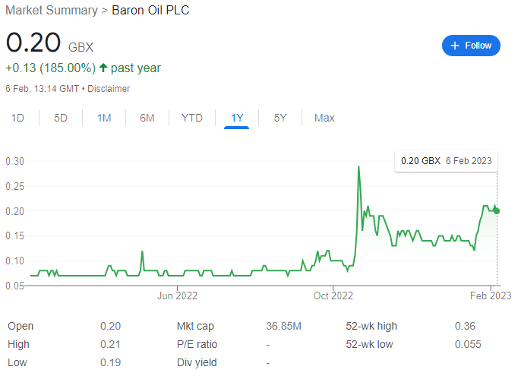Baron Oil shares will likely dip in the coming days. Short it at your peril.
Baron Oil remains one of my top four FTSE AIM picks for 2023. And fortunately, the stock has risen by 185% over the past year, and by over a third in the past month alone.

However, BOIL is a volatile stock and there is a reasonable chance that the shares will drop over the next couple of weeks, especially if it misses any of the artificial deadlines it has imposed on itself. This fact will not have escaped the attention of the shorters, who may feel that they can get away with making a quick profit.
As a long-term investor, I view myself — whether archaic or not — as a part-owner of the companies that I invest in, and shorting is very much not my style. However, I recognise that many of my stock picks — including PREM, AVCT, and HARL for example — are prime candidates for shorters to make a profit off synthetic share price falls. These are three companies where there are often long gaps between positive news, creating times when weak-handed investors sell.
Baron Oil is, in my view, not one of these opportunities. Its two assets are up for sale, and traders cannot know when either will be sold. This means that the usual technical jargon — cup handles, head and shoulders, double top, kangaroo tea cake or whatever — cannot be used to predict share price movements.
As an aside, the company recently refreshed its website, and this could predict a big announcement. Of course, I’ll readily admit that this is thin evidence.
Dunrobin
BOIL’s 32% interest in the UKCS P2478 prospect, offshore Inner Moray Firth has already seen technical work largely completed, and Baron thinks that Dunrobin West is ‘potentially a drillable prospect where an initial exploration well on the P2478 licence could target approximately 100 MMbbl of gross Mean Prospective Resources.’
A joint farmout campaign is ongoing, and the company plans to share the results of its subsurface re-evaluation ‘during February 2023.’ Of course, this self-imposed deadline that could see the share price slip if it is not met.
Shell, BP, and Harbour Energy are the three North Sea operators likely to take an interest in Dunrobin, but the political pressure to increase windfall taxes as profits reach obscene levels could see the three walk away from additional investment.
All three has voiced their disquiet over the current levels of tax, and have correctly pointed out that there was no state-sponsored rescue when Brent went negative in April 2020. Harbour perhaps has most reason to be disgruntled; as it operates almost exclusively in the North Sea, it is disproportionately impacted compared to Shell which only derives 5% of its revenues from the UK.
If BOIL only had this UK asset, then shorting could therefore be a viable strategy, even if Dunrobin is eventually sold off. But BOIL doesn’t just own assets in the UK.
Chuditch
Baron’s Timor Leste-based Chuditch project’s best-case aggregate gross gas-in-place estimate stands at 5.5 trillion cubic feet, and the best-case recoverable resource at 3.6 trillion cubic feet. Chuditch-1 gas discovery’s best case recoverable resource estimate alone is at 1.35 trillion cubic feet and therefore is ‘materially larger and may independently represent a liquefied natural gas (LNG) scale resource.’
For context, Baron holds a 75% interest in Chuditch, with the remainder held by the Timor Leste government. That’s 75% of — and I’ve said this before — a reserve equivalent to the current stockpile of the United States.
On 24 October, BOIL provided investors with a technical update from its ‘preliminary interpretation’ of the Chuditch PSC reprocessed 3D seismic data, and announced that ERCE had been contracted to prepare a ‘Competent Person’s Report.’ This report will provide BOIL with SPE PRMS compliant standard resource estimates for Chuditch-1, as well as an updated risk factor assessment. Again, the company ‘expects’ it will be ready ‘during February 2023.’
Artificial deadlines usually constitute a shorter’s dream, as any delay in announcements at either project will likely see the share price drop back. At the very least, I expect BOIL will become even more volatile as investors and traders wait for these two pieces of news. But as we cannot know when a sale will be agreed, shorting is a risky strategy.
Previously, I had considered that BOIL’s financial position as a £37 million minnow — it was worth less in November — meant it would need a strategic partner to start to entertain the idea of drilling. However, the company has made clear to investors that both Dunrobin and Chuditch are up for sale.
The question is — to who? There are two suitors at present. The key thing to understand is that the area’s geology is technically difficult to navigate. Details are available elsewhere, but the core issue is that building an offshore pipeline across the Timor Trench is difficult to justify economically.
However, ENI recently acquired the licence for the neighbouring ‘Block P,’ and has signed a MoU with Santos. But they’re not the only ones with a neighbouring interest; multi-billion-dollar titan Woodside is planning a JV with Osaka Gas to once again consider the economics of exploiting its ‘Greater Sunrise’ gas fields, located just 50km from Chuditch.
Woodside has emphasised a ‘strong focus’ on delivering the gas to Timor Leste and estimates that the field contain 5.3 trillion cubic feet of dry gas and 226 million barrels of condensate. The ASX 200 stalwart has told investors that it will be using the latest tech to evaluate all technical and commercial points of view to decide the best way to develop the field. Previously, the Timor Leste demand to have the gas processed in the country was the stumbling block, but this now appears cautiously resolved.

In the past, Woodside had argued that while crossing the trench was technically possible, it was not economically viable. However, CEO Meg O’Neill now believes that ‘against a backdrop of global geopolitical instability and constrained energy supply chains, there is an opportunity for the Sunrise Joint Venture to significantly advance this regionally important project.’
What she didn’t say was that Woodside has been blindsided by regulatory issues in Australia, which is increasingly turning towards green investments such as lithium mining. Rival Santos’ $5.5 billion Barossa venture is now hanging by a thread after a shock court ruling which saw Australia’s regulators toughen up requirements for Indigenous consultation.
Woodside’s $16.5 billion proposed Scarborough gas venture is its flagship growth project, and the ruling could now see the project derailed, or at the very least heavily delayed. Timor Leste on the other hand, is politically enthusiastic about development — and simply wants to ensure that the country sees a fair return on its natural resources.
In my view, BOIL remains one RNS from rocketing. Chuditch will eventually be sold, especially if development of Timor Leste infrastructure brings in economies of scale for the majors.
And if you disagree? Put your money where your mouth is — short it. Sleep well.
This article has been prepared for information purposes only by Charles Archer. It does not constitute advice, and no party accepts any liability for either accuracy or for investing decisions made using the information provided.
Further, it is not intended for distribution to, or use by, any person in any country or jurisdiction where such distribution or use would be contrary to local law or regulation.

Leave a comment